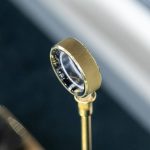The short introduction from the 17,000-word Carroll v. Trump, decided today by Second Circuit Judges Denny Chin, Susan Carney, and Myrna Pérez:
In this case, after a nine-day trial, a jury found that plaintiff-appellee E. Jean Carroll was sexually abused by defendant-appellant Donald J. Trump at the Bergdorf Goodman department store in Manhattan in 1996. The jury also found that Mr. Trump defamed her in statements he made in 2022. The jury awarded Ms. Carroll a total of $5 million in compensatory and punitive damages.
Mr. Trump now appeals, contending that the district court (Lewis A. Kaplan, Judge) erred in several of its evidentiary rulings. These include its decisions to admit the testimony of two women {Jessica Leeds and Natasha Stoynoff} who alleged that Mr. Trump sexually assaulted them in the past and to admit a recording of part of a 2005 conversation in which Mr. Trump described to another man how he kissed and grabbed women without first obtaining their consent. Mr. Trump contends that these and other asserted errors entitle him to a new trial. {[As to those other errors], Mr. Trump argues that the district court unreasonably restricted his defense by precluding (1) evidence that some of Ms. Carroll’s legal fees were being paid for by one of Mr. Trump’s political opponents and (2) portions of a transcript made by Ms. Carroll of a 2020 interview between Ms. Carroll and Ms. Stoynoff that, Mr. Trump argues, suggests that Ms. Carroll coached Ms. Stoynoff on her testimony. Mr. Trump also asserts that the district court erred in preventing him from cross-examining Ms. Carroll on three matters: her out-of-court claim that she possessed Mr. Trump’s DNA; her decision not to file a police report; and her failure to seek surveillance video footage from Bergdorf Goodman.}
On review for abuse of discretion, we conclude that Mr. Trump has not demonstrated that the district court erred in any of the challenged rulings. Further, he has not carried his burden to show that any claimed error or combination of claimed errors affected his substantial rights as required to warrant a new trial….
I have little to say about the substance of the analysis, since it has to do with evidentiary issues that I generally don’t follow; the opinion is available here, and is generally quite readable. (No part of the opinion deals with the substantive law of libel, which I do follow.) But here’s what struck me as an interesting and relatively self-contained analysis as to the litigation funding question:
The facts established during the ensuing discovery confirmed that Ms. Carroll’s case was taken on a contingency fee basis, and that, in September 2020, Ms. Carroll’s counsel received outside funding from a nonprofit to help offset costs. There was no evidence to suggest that Ms. Carroll was personally involved in securing the funding, interacted with the funder, received an invoice showing the arrangement before or after her counsel received the outside funding, or had discussed the arrangement with anyone between learning of it in September 2020 and being deposed in October 2022.
Upon consideration of this evidence, the district court granted Ms. Carroll’s motion to preclude evidence and argument about the litigation funding in the case. The district court concluded:
In general, litigation funding is not relevant. Here I allowed very limited discovery against what seemed to me a remote but plausible argument that maybe something to do with litigation funding arguably was relevant to the credibility of one or two answers by this witness in her deposition. I gave the defense an additional deposition of the plaintiff, and I gave the defense limited document discovery.
On the basis of all that, I have concluded that there is virtually nothing there as to credibility. And even if there were, the unfair prejudicial effect of going into the subject would very substantially outweigh any probative value whatsoever.
We perceive no abuse of discretion here.
First, district courts regularly exclude evidence of litigation financing …, finding it “irrelevant to credibility” and that it “does not assist the factfinder in determining whether or not the witness is telling the truth.”
Second, the district court did not abuse its discretion in precluding cross-examination on this point because, as the district court found, Ms. Carroll’s prior statement on the litigation funding was not sufficiently probative of her credibility. Ms. Carroll plausibly represented that she had forgotten about the limited outside funding counsel obtained in September 2020 when this question was first posed to her in 2022, and the additional discovery did not indicate otherwise. Rather, it showed that Ms. Carroll simply was not involved in the matter of who was or was not funding her litigation costs. Ms. Carroll testified that, after her counsel informed her in September 2020 that they had received some outside funding, she did not speak with her counsel about this topic again until the spring of 2023 and did not even know the funder’s political position or why they were partially funding her lawsuit.
Therefore, by the time of her deposition in October 2022, Ms. Carroll had not spoken with her counsel about the matter of outside funding for over two years. It was not an abuse of the district court’s discretion to conclude that the available litigation-funding evidence would have little probative value compared to its potential for unfair prejudice….
For similar reasons, we conclude that extrinsic evidence of the litigation funding had minimal, if any, probative value on the issue of Ms. Carroll’s bias and motive….
To the extent Mr. Trump argues that the acceptance of outside funding goes toward Ms. Carroll’s motive in lodging these allegations at Mr. Trump, the discovery also confirmed that Ms. Carroll publicly accused Mr. Trump of sexual assault over a year before the outside litigation funding was secured. Moreover, whether the outside funder was politically opposed to Mr. Trump was of little probative value because Ms. Carroll herself frankly admitted her political opposition to Mr. Trump, and her key witnesses testified to their opposition as well. On multiple occasions, defense counsel was able to bring out the political opposition and distaste for Mr. Trump held by Ms. Carroll and her witnesses.
{Mr. Trump separately argues that the district court also “improperly restricted questioning and argument regarding [an attorney, George] Conway.” Ms. Carroll testified at trial that about one month after she publicly accused Mr. Trump of sexually assaulting her, she attended a party where she met a lawyer named George Conway. Mr. Conway encouraged Ms. Carroll to seriously consider filing a lawsuit against Mr. Trump. The district court sustained an objection to portions of Mr. Trump’s opening statement that concerned Mr. Conway on the ground that counsel was impermissibly arguing to the jury that Mr. Conway had recommended Ms. Carroll’s counsel.
Even if Mr. Conway’s conversation with Ms. Carroll was somehow probative of bias, we find no error in the district court’s ruling. Argument related to Ms. Carroll’s choice of counsel had been ruled inadmissible pursuant to Ms. Carroll’s unopposed motion in limine. Further, contrary to Mr. Trump’s representation on appeal, defense counsel was permitted to meaningfully cross-examine Ms. Carroll about Mr. Conway. Ms. Carroll acknowledged that Mr. Conway had encouraged her to file the lawsuit, and defense counsel was able to argue these facts to the jury during summation.}
In light of the minimal probative value of the evidence, we conclude that the district court did not abuse its discretion in excluding it under Rule 403 [which provides that “a court may exclude relevant evidence if its probative value is substantially outweighed by a danger of one or more of the following: unfair prejudice, confusing the issues, misleading the jury, undue delay, wasting time, or needlessly presenting cumulative evidence”].
Roberta A. Kaplan and Matthew J. Craig (Kaplan Martin LLP) and Joshua Matz and Kate Harris (Hecker Fink LLP) represent Carroll.
The post Second Circuit Panel Upholds E. Jean Carroll’s $5M Win Against Donald Trump as to 1996 Sexual Abuse and 2022 Defamation appeared first on Reason.com.




